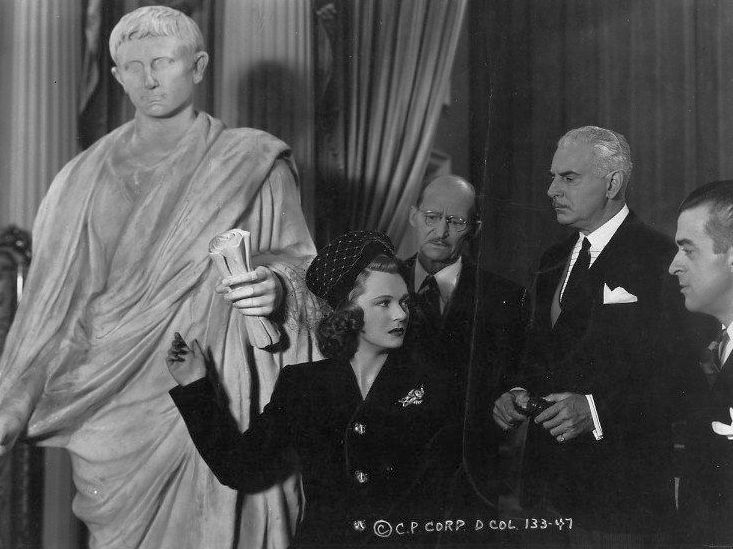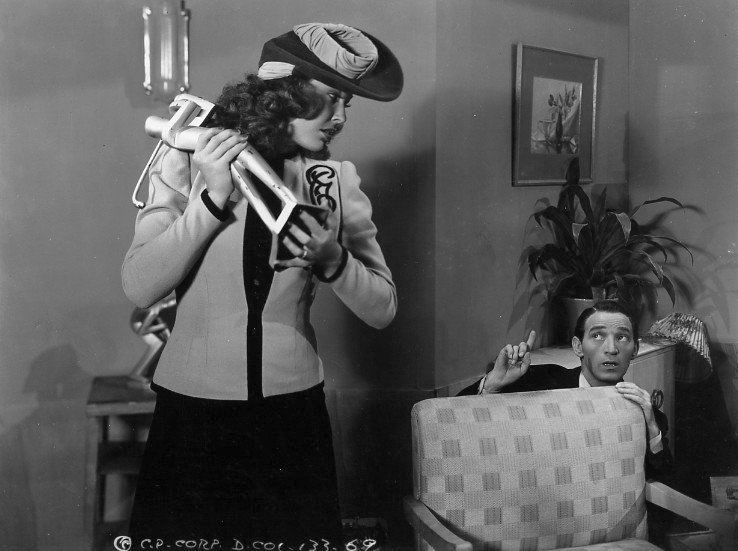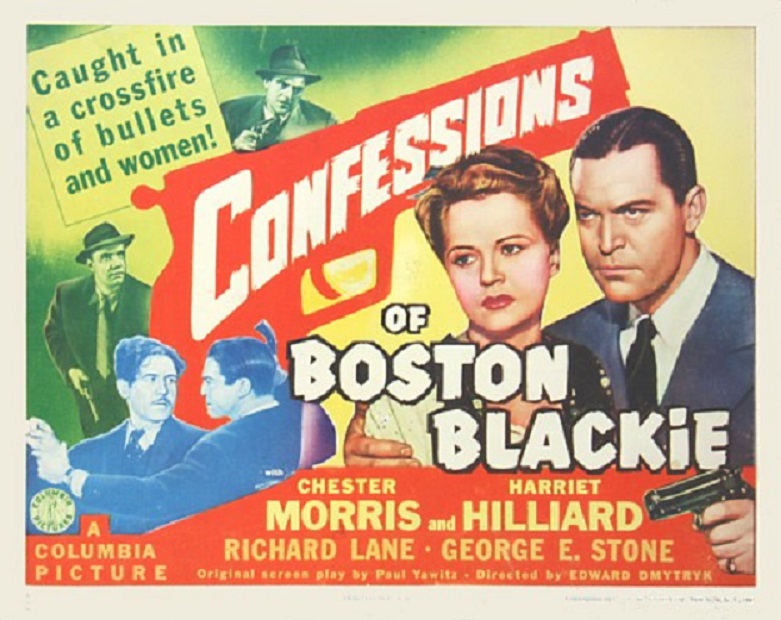Review: Confessions of Boston Blackie (1941)
Posted by Ivan G. Shreve, Jr. on Feb 14th 2014
Diane Parrish (Harriet Hilliard) has commissioned art dealer Eric Allison (Walter Soderling) to sell a valuable statue at an auction…but has no inkling that Allison and two of his confederates (Ralph Theodore, Kenneth MacDonald) are actually going to fob off a copy of the art treasure and keep the original for themselves. She learns of their duplicity at the auction, and when she attempts to blow the whistle on their scheme is shot by one of the men. Diane survives with just a flesh wound, but Allison is felled by the same bullet. And, because ex-jewel thief and safecracker Horatio “Boston Blackie” Black (Chester Morris) was also at the sale—at the request of his wealthy friend Arthur Manleder (Lloyd Corrigan) —he’s the number-one suspect in Allison’s murder. At least, that’s how Inspector Farraday (Richard Lane), Blackie’s nemesis on the force, figures it.
There’s no murder mystery at the heart of Confessions of Boston Blackie (1941); the audience knows the identity of the killer from the get-go. The bulk of the movie’s 65-minute running time finds Blackie staying one step ahead of Farraday as he attempts to locate Allison’s corpse (which the murderer has stashed inside the fake statue) in order to verify that the bullet didn’t come from his gun, thus proving his innocence. Confessions defies the conventional movie wisdom that sequels rarely stack up against the original; it’s every bit as entertaining as Meet Boston Blackie (1941) and, in a small way, improves on its predecessor with a suspenseful plot. It’s a bit far-fetched—but, hey…it’s a movie, not a documentary—and is leavened with lighter moments of first-rate comedy.

Chester Morris returns to play our hero, and he’s joined by Richard Lane (as Farraday) and Walter Sande—who played a uniformed cop in the previous Meet Boston Blackie but settles into his familiar role of Detective Matthews in the first of five Blackie vehicles. Making his debut in the series as “The Runt” is character great George E. Stone. Stone, whose cinematic specialty was playing lowlifes and stoolies (you might recognize him as “Toothpick Charlie” in Some Like it Hot), was positive perfection as Blackie’s comic relief sidekick, and would play the hapless Runt in every remaining Boston Blackie movie save the final entry, Boston Blackie’s Chinese Venture (1949). Also making his first Blackie film appearance is veteran actor-director Lloyd Corrigan as Blackie’s wealthy pal Arthur Manleder—Manleder was a recurring character in the Blackie franchise (the new Radio Spirits Boston Blackie collection, Outside the Law, even features Manleder in one of the broadcasts), appearing in eight vehicles and played by Corrigan in six. (Corrigan’s Manleder is the focus of one of Confessions’ priceless running gags as he helplessly attempts to extricate himself from a pair of handcuffs.)

Columbia’s B-picture factory served the useful purpose of providing work for their contractees as well as allowing novice directors a chance to earn their stripes. Confessions of Boston Blackie was one of the earliest features helmed by Edward Dmytryk, who would make a name for himself directing film noirs at RKO like Murder, My Sweet (1944) and Crossfire (1947); he also directed later classics such as The Caine Mutiny (1954) and Broken Lance (1954). While at Columbia, Dmytryk helmed a fun musical comedy entitled Sweetheart of the Campus (1941), and one of the female stars of that film, Harriet Hilliard, plays the leading lady here in Confessions. Harriet was just making a name for herself over the airwaves with her husband Ozzie Nelson (who was also in Campus) on Red Skelton’s Raleigh Cigarette Program when Confessions hit theatres; later, after Dmytryk went to RKO, he used Harriet in one of the Falcon entries he directed, The Falcon Strikes Back (1943).
Harriet’s a lot of fun in this film (she reminds me a little of Penny Singleton) and her performance is as far from the female half of “America’s favorite couple” as you could imagine. She gets a little competition in Confessions of Boston Blackie from actress Joan Woodbury (best remembered for playing comic strip heroine Brenda Starr in a 1945 Columbia serial adaptation), who essays the role of a conniver named Mona…out to shake down old flame Blackie at a most inopportune time. You might also recognize Bowery Boy William “Billy” Benedict as an unfortunate ice cream vendor who hilariously has his uniform stolen twice by Blackie as he attempts to elude the cops. In addition, familiar Three Stooges villain Kenneth MacDonald (who later played a judge in a number of Perry Mason episodes) is on hand here as one of the bad guys; he’s distinguished by his sebaceous manner and rich, resonant voice.

Jay Dratler, who wrote the story and screenplay for Meet Boston Blackie, teamed up with Paul Yawitz to concoct the engaging story for Confessions. Yawitz is credited with the screenplay and would contribute other Blackie scenarios including the third movie in the series, Alias Boston Blackie (1942)—which Radio Spirits will review next month. (It’s Christmas, Boston Blackie-style!) In the meantime, we encourage you to seek out Confessions of Boston Blackie the next time it turns up on Turner Classic Movies…and if that’s too long a wait, our newest CD collection, Outside the Law, is just the tonic if you need a Blackie fix.

